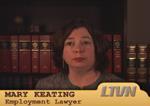Discrimination
MARY KEATING: If you believe you have been discriminated against on the job, I look first for your gut feeling, but then we have got to be able to back it up and show the connection between your race for example and that bad thing that happened to you on the job.
ROCHELLE EISENBERG: Often people with these kinds of claims have kept diaries. They are writing down everything.
MARY KEATING: Sometimes you might have a good document that shows that you were treated differently from someone else. They are writing down every nasty comment that was made, every inappropriate remark that was made and you can bring that together with other evidence to show it was because of your race. Witnesses who can say that they heard the supervisor say something would be wonderful. Sometimes you might be able to show a pattern of all the promotions going to white men under 40 for example.
ROCHELLE EISENBERG: Employment discrimination litigation is like a tennis game. The ball starts off in the employee's court.
MARY KEATING: You are going to have to go to the Equal Employment Opportunity Commission where the state equivalent in your state. Your have a short time frame to make your complaint. The EEOC has the power to demand an answer from the employer and documents and try to make them either comply with the law or give you an investigator file at the end of the day. In rare cases, the EEOC will actually take your case to court for you, but if it does not, it will tell you, you have a period of time, 90 days, to go to Federal Court yourself. It will be your burden to prove it and it is not always an easy one.



